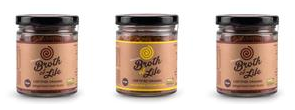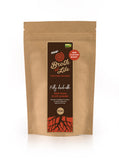Having just completed our recent audit with NASAA to continue being a certified organic company, I am going to have a rant about the flippant use of the word Organic in this country.
Broth of Life have voluntarily chosen to undergo a very rigorous and often expensive certification process each year to build trust and ensure the best possible outcome for the consumer.
The audit is, to say the least, gruelling and labour intensive, especially for a small to medium business. It is a hard test to pass and is performed annually with the possibility of a spot check at any given time. It has you constantly on your toes, but leaves you knowing you have done everything imaginable to ensure an organic product of highest quality is the end result.
Most products these days can use the word organic anywhere on their label, whether they use organic produce or not. They can even use it in their brand name.. such clever marketing! And those organisations that aren't lying about the "organic" product to just join the band wagon, will say they are using organic items such as "organic grass fed beef bones". That is all well and good, but what about the the many other factors that come into play?
What’s the difference between ‘organic’ and ‘certified organic’?
Put simply, anyone can claim to be ‘organic’ but in order to trust that they really are they need to be ‘certified organic’. In order to be certified organic in Australia a product needs to be grown or manufactured free from synthetic pesticides, herbicides, hormones and antibitotics. In the case of farming, livestock must be free range, pasture feed, seed must be non-genetically modified and all processes must be water efficient and biodiversity friendly.
It is a good idea to ask these questions about an "organic" company:
Ingredients: Are ALL ingredients certified organic? If not, why not? A single non organic ingredient compromises the organic status of the product.
Cleaning: Were any chemicals used in soaps, dishwashing liquid, dishwasher detergent/powder, spray and wipes, sanitisers, mould removal, antibacterial treatments, floor cleaner? Did any of those come into contact with boxes containing food or food items? Is there proof that all cleaning items are chemical free?
Pest Treatments: Were any chemicals used to keep the kitchen safe from flying insects, crawling insects and rodents? Did they come into contact with food items?
Fridge and Freezer: Are the cold rooms dedicated certified organic ingredients only? Is there a separate cold room for any non organic ingredients? Has the organic item touched another item that is not organic, and hence contaminating that ingredient?
Storage: Are there any non organic ingredients on the storage shelves? Or is it a dedicated organic area with a 2nd area for non organic ingredients clearly separated to ensure no items touch?
Transport: How are the raw ingredients and final products transported? Are the trucks dedicated organic transports? How are the trucks cleaned down? What chemicals are used that may contaminate the organic produce?
Cooking facility: What cooking equipment is used? Is there any aluminium that can contaminate foods? Any plastics that may cause issues? What material are they dehydrator sheets made of?
Packaging: What is the final product packaging? Are there any chemicals in the pouch or container used that is the final packaging for the product?
As you can see, there is a great deal more to think about than just "Oh, we use organic free range chicken frames".
And while on the topic of ingredients, can an organisation prove they have used nothing but certified organic ingredients? To be certified you do! All invoices showing the number of kilograms received from a certified organic supplier must be provided, and the number of kilograms used in pre-approved recipes must also be shown, to guarantee no variation in weight. Can a non certified organisation prove nothing has been added to their cooks to increase the yield? Or that they didn't just slip regular non organic ingredients into their cook?
How do we know if something is certified organic?
Simple! Just look for a logo that says ‘certified organic’. It might look something like one of these:
If the product is wrapped you should be able to find this on the packaging. In the case of fruit and vegetables (or if you’re unsure) a business will have their organic logo displayed or be able to provide you with their organic certificate. When in doubt, just ask!
How is this regulated?
Australia is currently one of the only nations in the world without a mandatory domestic standard for the use of the word organic. It causes confusion for consumers and disadvantages those of us who do the right thing and become certified. It allows non-certified operators to make false claims and use the word organic on packaging. Consumers are paying for the 'organic' product whether it has been through the rigorous audit, or not.
While a thorough inspection is performed on any international food product claiming to be organic and entering our country from abroad, there is NO regulation within our own country. I am personally horrified and furious that anyone at all can use the word Organic on their labelling without going through the scrutiny and process required to be certified. It did at one point make me wonder why I bother.
Every export market requires proof an Australian organic product meets their own country's standards. This means even though a product is certified in Australia, it cannot contain the word "organic" anywhere on the packaging unless it is also certified in that country. Broth of Life for example has one set of labels for its Australian market where we are certified organic, and one set of labels for the US and European markets where the word organic must be removed until we pass organic certification in each individual country. We must go through the full process of getting certification in each separate export market unless Australia can lift its standards on the use of the word organic.
Support those who have made the effort
So next time you are trying to do the right thing by your body AND the environment in choosing an organic product, take a moment to really look at the product packaging to see if the product is certified organic. If not, then they are false claims. It may seem like such a small thing, but it is in fact a HUGE difference.
BUY DEHYDRATED BONE BROTH

BUY FREEZE DRIED BONE BROTH POWDER



